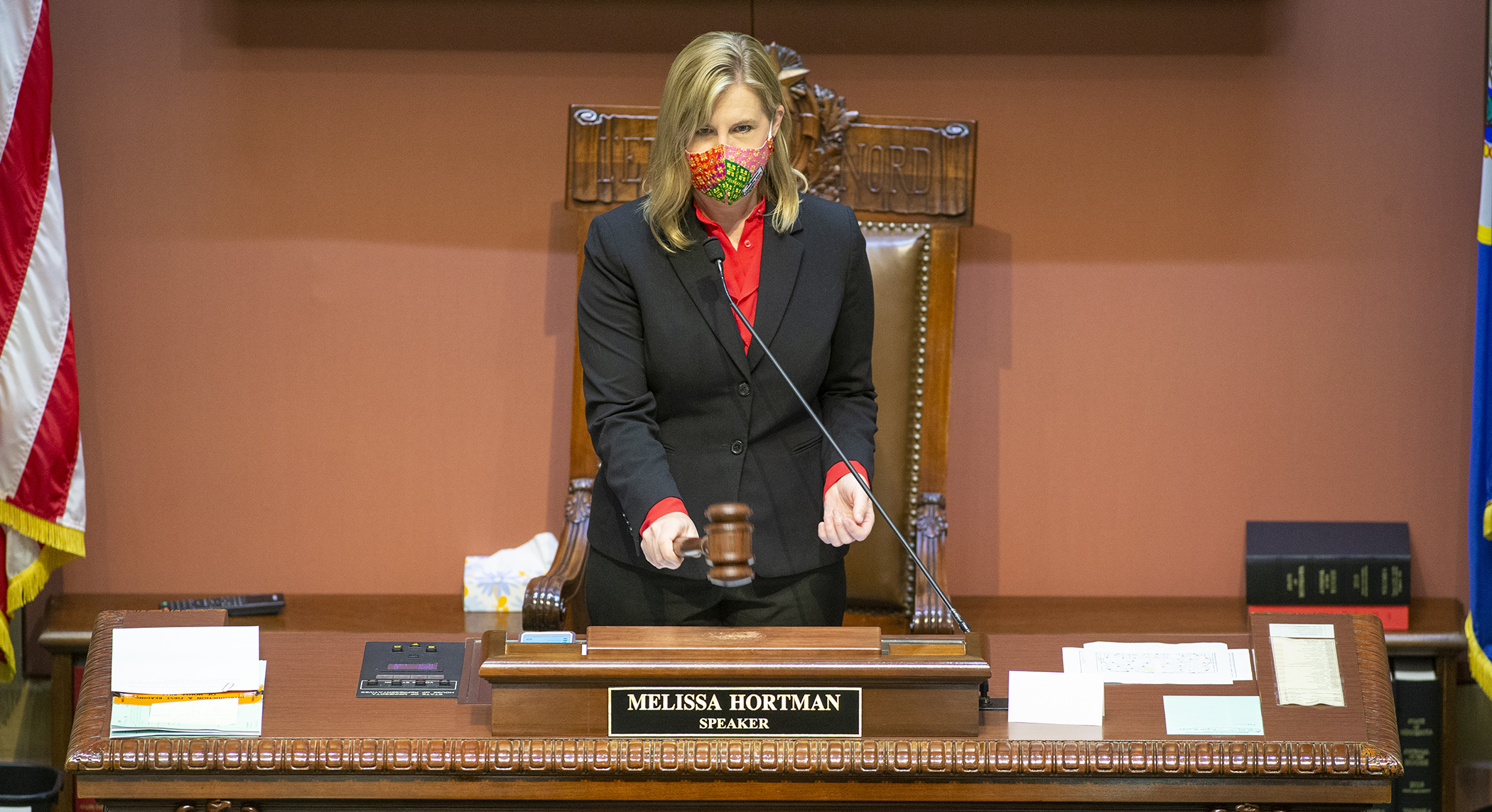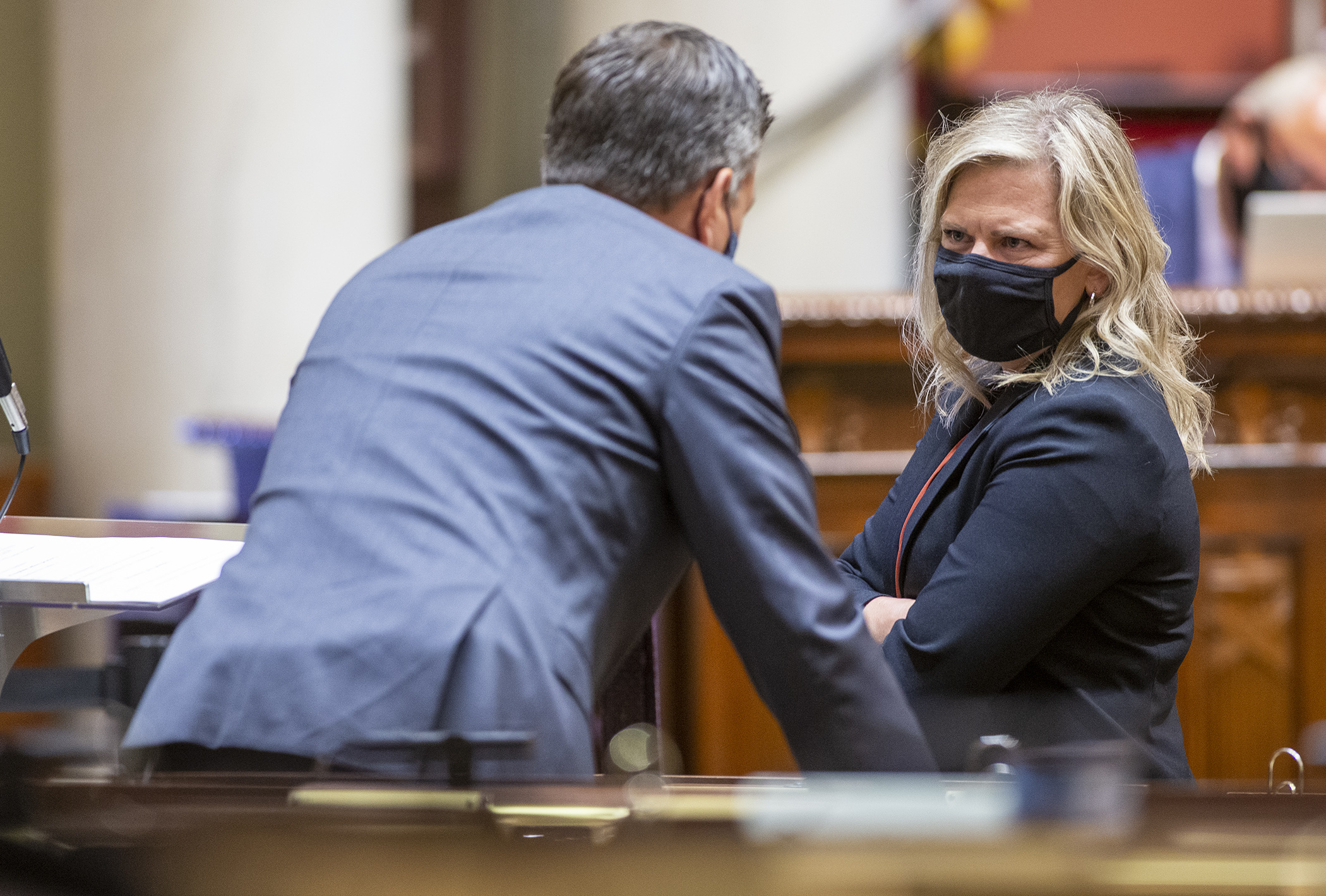Summer’s third special session a quick one — but leaders say ‘unfinished business’ remains

(Correction Aug. 13, 2020: An earlier version of this story stated the House rejected a motion to bring up a Senate resolution; it was a House resolution.)
The DFL-controlled House reaffirmed Gov. Tim Walz's pandemic-related emergency powers — by rejecting a move to bring up a resolution aimed at ending them — and also passed more than $30 million in grant assistance for disability service providers before wrapping up a four-hour special session Wednesday afternoon.
Walz last week called lawmakers back together for the third time this summer in order to extend the COVID-19 peacetime emergency declaration in place since March. Like the special sessions in June and July, the Republican-controlled Senate passed a resolution to end that emergency. But a House motion to take up its own resolution to end the emergency was again unsuccessful.
Both chambers must vote to end a peacetime emergency.
 House Majority Leader Ryan Winkler and Rep. Anne Neu confer on the House Floor during the third special session of 2020 Aug. 12. Photo by Paul Battaglia
House Majority Leader Ryan Winkler and Rep. Anne Neu confer on the House Floor during the third special session of 2020 Aug. 12. Photo by Paul Battaglia“The pandemic is not done with our country yet,” House Speaker Melissa Hortman (DFL-Brooklyn Park) said during a remote news conference Wednesday morning. “We need to get control of the virus so we can get to a point where we can get things restarted, and rebound, and get some economic growth. But we’re not there yet — and for that reason the governor needs to continue to have this emergency authority to make fast decisions and move resources quickly.”
Republicans have been frustrated by the sweeping powers afforded Walz under the months-long order and have expressed displeasure with the Legislature’s limited role in the state’s COVID-19 response.
“Take back your role,” said Rep. Jim Nash (R-Waconia), urging House members to take up the Senate resolution. “Take back your role as legislators and policymakers.”
Unlike the summer’s previous special sessions, no major pieces of legislation were on lawmakers’ to-do list. That, Hortman said, was due to a required quiet period following state bond sales that prevented the Legislature from passing bills that would impact the General Fund or the state’s indebtedness.
“We have a lot of unfinished business yet to do before we conclude our work for 2020,” said House Majority Leader Ryan Winkler (DFL-Golden Valley). Hortman said she hoped to bridge differences with House Republicans to find the necessary votes to pass a bonding bill during a September special session.
Funding for disability providers
The House did take action to provide economic relief to disability service providers. Members voted 129-1 to pass SSHF1/SSSF1*, which would appropriate more than $30 million for grants to those businesses.
Passed 67-0 by the Senate earlier in the day, it now goes to the governor.
That money is meant to help providers struggling to stay in business after service interruptions and closures caused by the COVID-19 pandemic. Their survival is important not only to the businesses themselves, but the people they serve.
The bill would appropriate $20 million for grants to home- and community-based providers to help them pay employees and maintain safety standards. It would also provide $10 million for public health grants to help providers with the resources they need to reopen safely with proper social distancing.
Rep. Hunter Cantrell (DFL-Savage), the bill sponsor, said it is an essential lifeline for these businesses.
“It is critical at this point in time that we ensure that the disability day-service provider infrastructure does not deteriorate and leave families and Minnesotans with disabilities without access to these vital resources and services either during this pandemic or into the future,” Cantrell said.
Although many members spoke in favor of the bill, several said it should have been passed sooner. And Rep. Jack Considine Jr. (DFL-Mankato), who cast the lone vote against the bill, said while the legislation is very much needed, he could not support it because it provided no money for home health of personal care aides.
“The people on the front lines that are doing the work with kindness and compassion are once again left out,” Considine said. “I just can’t stomach that.”
School re-opening update
Earlier Wednesday, the House Education Finance Division held an informational hearing on plans for the upcoming school year. Members received a presentation from Department of Education officials, including Deputy Commissioner Heather Mueller, who outlined the state’s Safe Learning Plan for 2020-21, meant to ensure each student receives an equitable education and has equal access to learning and instruction during the COVID-19 pandemic.
The health of students, staff and families is the plan’s top priority, followed by as much in-person learning as possible, especially for younger children who are less able to learn remotely.
Mueller said the plan’s in-person, distance and hybrid learning alternatives for schools recognize the reality that different approaches will be taken in different districts.
“We know that one size doesn’t necessarily fit all,” she said, adding that flexibility for school districts is important as the situation changes and the virus becomes better or worse in different areas of the state.
Mueller also discussed funds sought from the federal government to help schools pay for their response to the pandemic. She said $256 million has been requested:
- $244.8 million would go to operating costs and to support students, families and educators;
- $6 million would be used for saliva tests for educators and school staff; and
- $5.2 million would go to supplies for schools, including face coverings for students, educators and staff.
Education Commissioner Mary Cathryn Ricker said the department is committed to sharing best practices from school districts that had success during the spring in order to help others this fall.
“We absolutely want to walk alongside our school districts … as we create the safest and healthiest learning conditions possible,” Ricker said.
— House Public Information Services writers Jonathan Avise and Jonathan Mohr contributed to this story
Related Articles
Search Session Daily
Advanced Search OptionsPriority Dailies
Ways and Means Committee OKs proposed $512 million supplemental budget on party-line vote
By Mike Cook Meeting more needs or fiscal irresponsibility is one way to sum up the differences among the two parties on a supplemental spending package a year after a $72 billion state budg...
Meeting more needs or fiscal irresponsibility is one way to sum up the differences among the two parties on a supplemental spending package a year after a $72 billion state budg...
Minnesota’s projected budget surplus balloons to $3.7 billion, but fiscal pressure still looms
By Rob Hubbard Just as Minnesota has experienced a warmer winter than usual, so has the state’s budget outlook warmed over the past few months.
On Thursday, Minnesota Management and Budget...
Just as Minnesota has experienced a warmer winter than usual, so has the state’s budget outlook warmed over the past few months.
On Thursday, Minnesota Management and Budget...